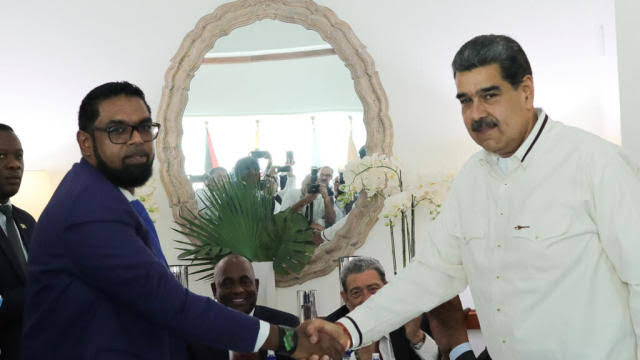Land Dispute: Venezuela, Guyana Agree Not To Escalate Conflict
Venezuela and Guyana have agreed not to resort to force to settle a territorial dispute over the oil-rich Essequibo region after a tense meeting between the two countries’ leaders in the Caribbean.
Guyanese President Irfaan Ali and Venezuelan President Nicolás Maduro agreed to “not threaten or use force against one another in any circumstances, including those consequential to any existing controversies between the two states” and to “refrain, whether by words or deeds, from escalating any conflict,” in an 11-point declaration that was read out at a press conference after the meeting.
The two men were unable to make progress in resolving the long-running dispute over the territory, however, with a joint commission composed of the Foreign Ministers of both countries and other officials asked to address the issue and report within three months.
No questions were allowed at the press conference.
Essequibo amounts to more than two-thirds of the territory of Guyana and is home to 125,000 of its 800,000 citizens.
Tension has been rising in recent weeks after Venezuela held a referendum earlier this month on whether to establish a Venezuelan state there in a move Guyana feared was a pretext for a land grab.
Venezuela insists Essequibo should be under its control because it was within its borders during the Spanish colonial period while Guyana says a border drawn by international arbitrators in 1899 means it is part of Guyana.
The hours-long meeting between Ali and Maduro took place at the main international airport in the eastern Caribbean island of St Vincent following mediation efforts by the regional groupings of the Community of Latin American and Caribbean States (CELAC) and the Caribbean Community (CARICOM).
The declaration noted the impasse between the two men, who clasped hands before their talks.
Guyana argues the controversy should be resolved by the International Court of Justice in the Netherlands while Venezuela says the court does not have jurisdiction.
ALJAZEERA


Comments are closed.